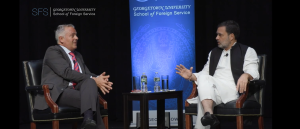Indian opposition leader Rahul Gandhi called for political and economic equality for all Indian people at a discussion that the Georgetown University School of Foreign Service (SFS) hosted Sept. 9.
During the conversation, Gandhi, the parliamentary leader of the centrist Indian National Congress (INC) party and a four-term member of the Lok Sabha, the lower house of India’s parliament, addressed the stark political divide between members of the opposition and Prime Minister Narendra Modi’s followers in the right-wing Hindu nationalist Bharatiya Janata Party (BJP). Gandhi’s discussion came during a three-day visit to the United States, during which he met with members of the Indian diaspora, U.S. politicians and students and faculty at Georgetown and the University of Texas at Dallas.
In the conversation with Edward Luce, the U.S. editor and columnist for the Financial Times, Gandhi said modern India has long debated the question of equality.
“I think India has had this fight, modern India has had it embedded in it, the fight for and against the constitution, and that’s really the heart of it,” Gandhi said at the event. “The idea that all Indians should be equal, all Indians should be valued and treated in the same way, versus a hierarchy and the idea that there is a caste hierarchy in India that should be defended at all costs.”
India’s caste system, which originated over 3,000 years ago, divides Hindus into fixed, immutable hierarchical groups. Caste identity is passed down by descent, and members of each caste were historically expected to follow certain societal guidelines based on their position in the hierarchy. The Indian constitution formally outlawed discrimination on the basis of caste in 1950, although prejudice against individuals from lower castes still remains prevalent.
Gandhi said his party seeks to increase social mobility, ensuring that all Indians, rather than a group of elites, have access to economic and political opportunities.
“If we talk about a nation that is going to progress, and if we talk about India becoming a modern nation, we have to ask the question about participation of 90% of our population,” Gandhi said at the event. “We can’t just ignore it. There’s just no way we can ignore it because frankly, if we go down this path, it’s not sustainable.”

“Frankly, as a politician, I don’t want to live in a country where 90% of the people do not have access to opportunity,” Gandhi added.
Modi, who has served as Prime Minister since 2014, has governed as a Hindu nationalist, linking religion and major infrastructure projects while enacting controversial policies, such as stripping Kashmir, India’s only Muslim-majority state, of its special constitutional status. His party has restricted free speech and been accused of chipping away Indians’ civil liberties.
Gandhi said his party achieved an unexpectedly positive result, forcing Modi to govern as part of a coalition for the first time, in the recent election because it campaigned on constitutional issues and accused Modi’s party and far-right groups such as the Rashtriya Swayamsevak Sangh (RSS), a Hindu nationalist paramilitary organization, of undermining Indian democratic institutions.
“We’d stress on this idea that, look, the institutions are captured and we don’t have a fair playing field. The education system is captured by the RSS, the media system is captured, the investigative agencies are captured,” Gandhi said. “India realized in this election and, really, not to divide it so crudely, but poor India, disenfranchised India, oppressed India — that India, it understood that if the constitution goes, the whole game is gone.”
“Poor people deeply understood that now, this was a fight between those who are protecting the Constitution and those who want to destroy it,” Gandhi added.
Gandhi said the INC aims to use its power to uphold the constitution.
“There are two different issues: One is fighting and winning elections, and we’re confident that we will fight and win elections against the BJP,” Gandhi said. “The real challenge in front of India is how do you make our institutions neutral again.”
Gandhi said his party seeks an India that is inclusive and multicultural, in contrast to the unified Hindu nation-state Modi seeks to govern.
“India at its heart, right, is a union of languages, traditions, histories, religions, everything, and that’s just the design of India,” Gandhi said. “This idea of mixing and merging, this is India. And the misunderstanding that the BJP and the RSS have is that they think that India is a whole bunch of separate things. It’s not.”
Gandhi said his party aims to offer a sense of hope to young people who have little hope for the nation’s future.
“It’s millions of people, young people giving India a vision that gives them hope, that’s it, and putting in front of the people of India a set of ideas that makes them believe in the future,” Gandhi said.
“India is struggling to imagine the future. You know when you struggle to imagine a future, you start discussing the past, right, so what is Mr. Modi’s or RSS’s proposal?” Gandhi added. “The proposal is, let’s not discuss the future, let’s talk about the past, and that’s very dangerous for a country like India, the scale of India, and it’s also boring.”